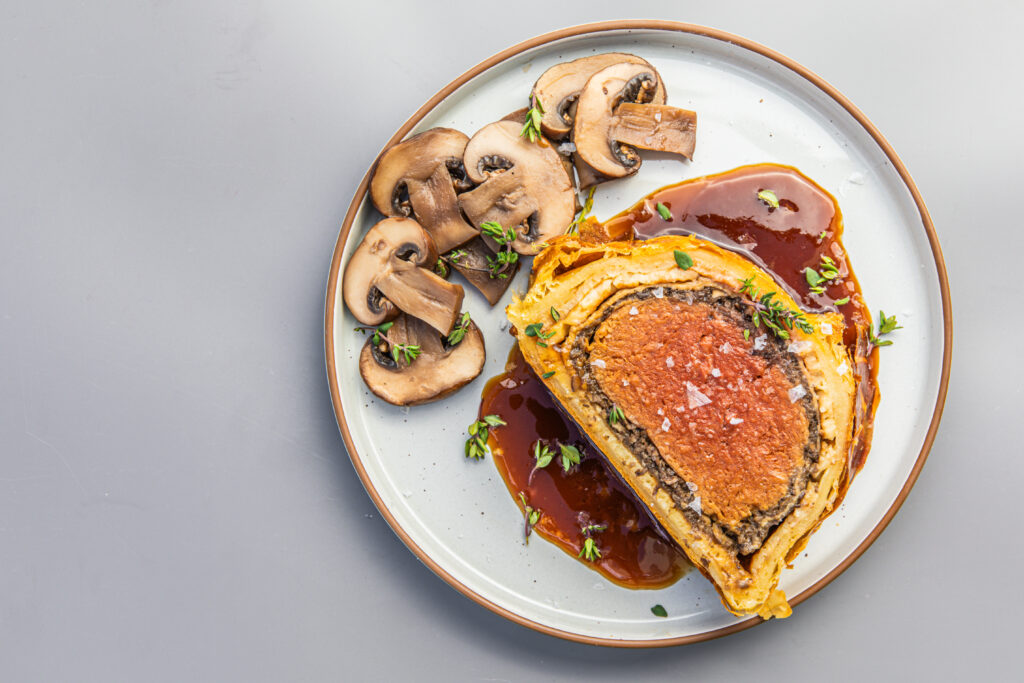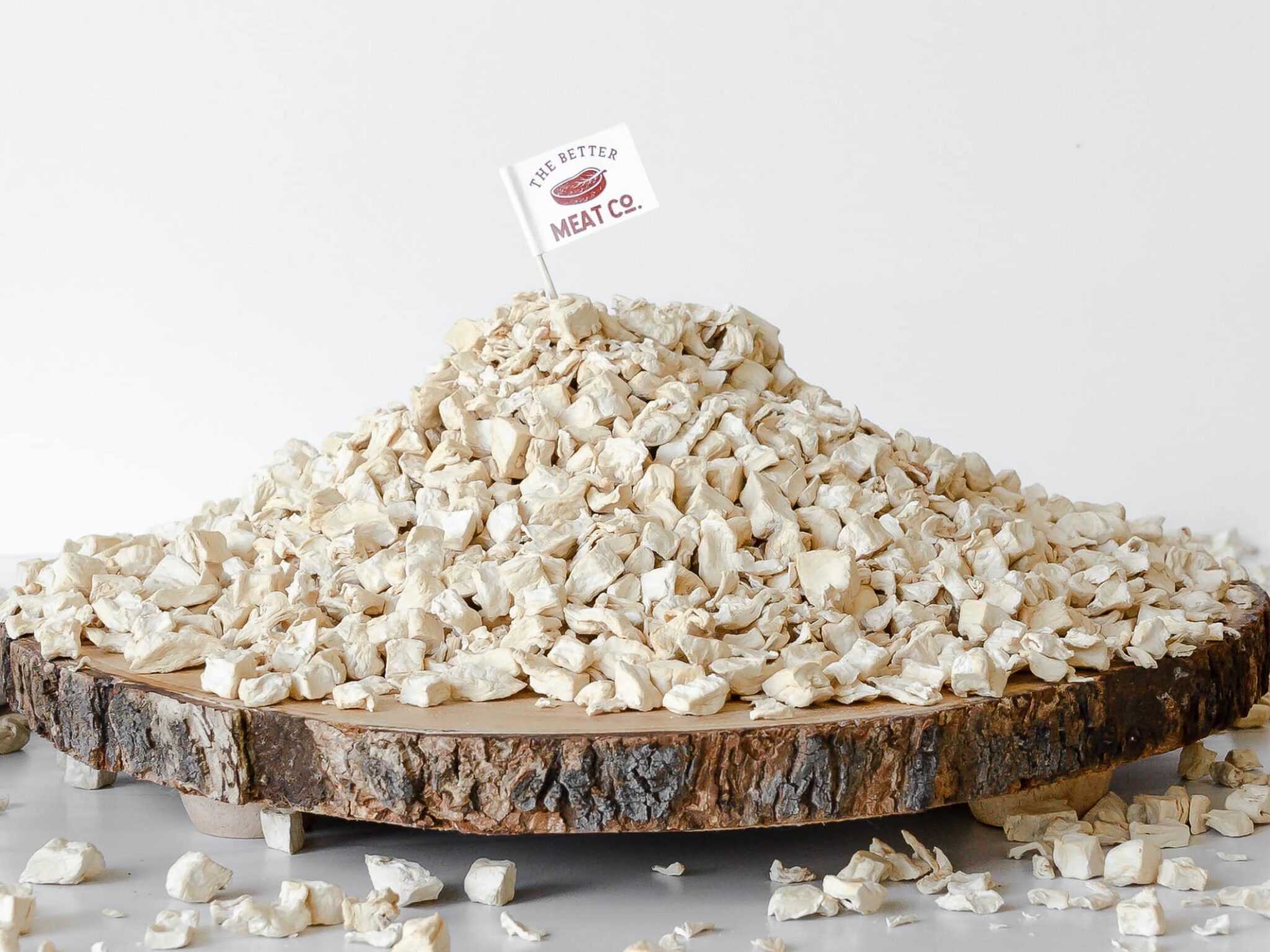The Better Meat Co Receives FDA GRAS Approval Letter for Rhiza Mycoprotein
5 Mins Read
Californian food tech startup The Better Meat Co has received a ‘no further questions’ letter from the US FDA, certifying its Rhiza mycoprotein as safe to use in meat products and dairy analogues.
Two years after applying for FDA approval, The Better Meat Co has received a ‘no further questions’ letter from the US food safety authority, meaning its mycoprotein now has GRAS (Generally Recognized as Safe) status.
It marks the first FDA letter to cover a mycoprotein strain outside of the Fusarium genus (which is used by both Quorn and Enough Foods, both of whom have been granted the letter).
According to The Better Meat Co’s GRAS notice, its fungi strain (Neurospora crassa) has an extensive history of use in food globally. It has been used to produce oncom, a traditional fermented Indonesian produced from byproducts like soy pulp (or okara), as well as in fermented okara in China’s Gannan district.
Additionally, the strain is part of the starter mass used to make a Brazilian fermented alcoholic drink called tiquira, and is one of the organisms present in Roquefort cheese when produced in traditional southern French cheesemaking methods.
Simultaneously, The Better Meat Co’s Rhiza mycoprotein was evaluated as a meat enhancer by the USDA, which classed it as suitable and safe for inclusion in blended meat products.
Rhiza mycoprotein can be used in meat, seafood and dairy analogues

The Better Meat Co’s mycoprotein had already obtained self-affirmed GRAS status, which enabled it to supply Rhiza (produced at its Sacramento plant) to restaurants in North California for animal-free steaks, carne asada, and foie gras.
Self-affirmed GRAS certification doesn’t legally require FDA review. Companies only need to conduct a safety approval by a scientific panel, which can include both internal and external experts. This can be done without disclosing safety data publicly, helping maintain confidentiality around IP.
It’s an easier, cheaper and faster way to commercialise. But it does mean companies are making their own safety assessments independently from the FDA (while complying with its requirements). This is why many choose to go through the GRAS notification process. A much more rigorous process, it requires the submission of a host of comments, including positive and negative reviews of ingredients.
If approved, the FDA sends the ‘no further questions’ letter, deeming the ingredient safe for sale. This is seen as a more transparent process with publicly available data and breeds both market and consumer confidence.
The mycoprotein can be used to make beef, pork, chicken and seafood analogues at levels ranging from 30-90%, as well as dairy alternatives like milk, cheese, coffee creamers, yoghurt and ice creams at a maximum inclusion rate of 15%.
Plus, it can be used as a meat extender as part of blended meat applications (which combine conventional meat with plant-based or fermentation-derived ingredients). The GRAS notification suggests that companies can substitute meat with 10-50% of Rhiza.
Blended meats are having a moment right now, with legacy butchers and even global food giants entering the space. The Better Meat Co won’t be the first company to offer mycoprotein for blended meat, with UK market leader Quorn supplying it to foodservice and hospital caterers in the UK this year.
However, The Better Meat Co has a better pedigree than most others when it comes to blended meat. Its legacy plant protein has been part of Perdue Farms’ Chicken Plus line since 2019. Now available in over 7,000 stores, it has proved to be one of the longest-standing and most successful examples of blended meat to date.
The Better Meat Co looks to scale up

The FDA’s ‘no further questions’ letter comes shortly after The Better Meat Co slashed the production costs for its mycoprotein. When produced at scale, it will now cost the same as commodity beef, even if no further R&D advancements are made.
This advancement followed the end of the startup’s bitter legal dispute with fellow mycelium meat company Meati, which has been ongoing since December 2021. The Better Meat Co had sued Meati for undermining its IP and attempting to “bully” a less-funded rival. Meati, which also employs submerged fermentation tech, responded by accusing the former of stealing its IP.
The dispute stemmed from the fact that when The Better Meat Co was granted a patent for its tech, the inventor was listed as Augustus H Pattillo, who had previously spent a year working on a Department of Energy fellowship at Chicago’s Argonne National Laboratory, at the same time Meati (then called Emergy and working on renewable batteries) was doing work at the agency too.
But a judge in California’s Eastern District ruled largely in favour of The Better Meat Co last month, reprimanding Meati for using “sandbagging” tactics and “shenanigans”, including serving The Better Meat Co with nearly 3,000 pages of documents the night before a hearing on May 17. Meati said it supported its inventorship claims, but the judge argued that the company’s counsel offered “no credible explanation” of why it didn’t provide such materials sooner.
The legal battle hindered The Better Meat Co’s ability to fundraise, having secured only $27M in investment (compared to Meati’s $365M). And without raising capital, it has been unable to scale up production to meet commercial-scale demand for its mycoprotein.
But those efforts will be in full force now, with The Better Meat Co having signed multiple letters of intent and offtake agreements with major CPG brands in both the US and Asia. It has also been working with Hormel Foods and Maple Leaf Foods to develop meat analogues.
These companies would have been encouraged by Rhiza’s nutritional credentials – based on its dry mass, it contains 30g of fibre and around 45g of protein per 100g, with a protein digestibility score of 0.87-0.96 (close to casein, beef and eggs).
The Better Meat Co describes its mycoprotein as having a “firm meat-like texture and mouthfeel”, with its filamentous nature setting it apart from plant-based meats made from soy, wheat or pea protein. “The product is not a protein isolate, but a whole biomass ingredient; accordingly, it offers a wider range of nutrients in addition to merely protein and retains the native whole food matrix,” its notice states.



